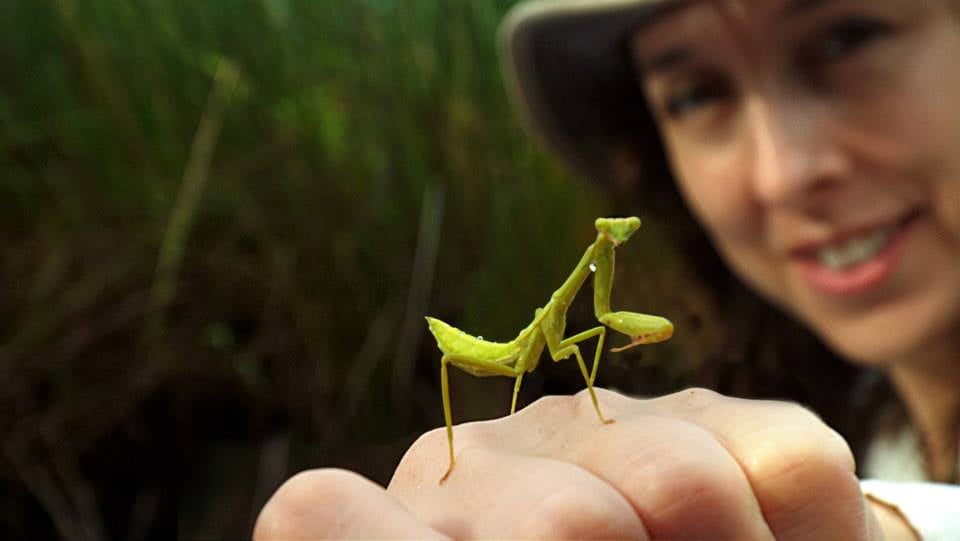 Photo credit: Dr. Amy Deacon For girls who are thinking about pursuing a career in science, try investigating professions beyond medicine and engineering advises zoologist and lecturer at the University of West Indies (UWI), St. Augustine Campus, Amy Deacon.
“There are many interesting and cool areas in science,” said Deacon on the special Crick Crack Science Live Show hosted by UpComms PR on February 8, 2022, in recognition of International Day of Women and Girls in Science. “There are so many different jobs,” she explained. “Even though you might feel some pressure to go into one of those very established careers that everyone has heard of, don’t get penned in by that. If [science is] something that you're really interested in, then, persist and go for it because we need more, people like you,” she said. Not being pigeonholed herself, Deacon’s interests include behavioral ecology, invasive species, patterns of biodiversity, and aquatic ecology. She has conducted research on Trinidad’s guppy and freshwater biodiversity. In one project, she and her team worked on finding a noticeable effect on rivers due to our love of river limes here on the islands of Trinidad and Tobago. “We revisited rivers four times a year for five years--the same rivers,” said Deacon. “At that point, we were particularly interested in recreational disturbance. In other words, river limes. People use the rivers not so much these days because, you know, there're [COVID-19] restrictions in place. But generally, people love to spend time at rivers eating, drinking, playing music, and just relaxing--and you can have an impact on those rivers. So, we were interested to see if we could detect like a signature of a river-lime effect on the species and the environment.” Deacon and her team have plans to continue their work later this year along with a couple ongoing projects at the UWI Department of Life Sciences. One such project, “Improving the Accessibility of National Biodiversity Data in Trinidad and Tobago," involves collecting and uploading data on specimens or records of local species for open access online. The project, supported by a grant by the Global Biodiversity Information Facility via its Biodiversity Information for Development, is in partnership with the National Herbarium of Trinidad and Tobago, The University of the West Indies Zoology Museum, and the National Museum and Art Gallery of Trinidad and Tobago. “It's a great team and actually it's an all-female team. Our aim over the next 18 months is to upload and publish as much of that data as possible,” says Deacon. Asked whether she encountered gender stereotypes along the path to her career in science, Deacon said she’s been lucky not to. “I haven't had very many direct experiences that have been negative in that regard. But it definitely is something that I know people do encounter and, of course, it's something that, even subconsciously, you know, we all get affected by.” As Deacon’s work may involve trekking through the forests and stepping in and around rivers and streams, she dismisses any stereotype that suggests women are somehow less capable. “There're certainly some people who might perceive that women would be less able to do field work: less strong or less willing to get dirty. I think that is a stereotype that you have to kind of combat a bit--with the idea that we can do that just as well as men can,” she said. However, Deacon points out that there still appears to be a glass ceiling when it comes to reaching certain ranks in academia. “When I was recruited as a lecturer, there were five of us recruited at the same time at the lecturer level, and all of us were women, which was amazing,” she said. “It was great to have that cohort together to support each other, but if you look high up the ranks [at, for instance,] the senior lecturer professor, it just diminishes. Those senior positions are very much still male dominated even today.” Certainly, more diversity can only make things better Deacon agrees. “I do feel strongly that in all fields–and, maybe, what I know is [the field of] science--it's clear that having a community that is diverse in terms of your background, in terms of your gender, and in terms of your ethnicity--all of those things--bring diversity, which brings new perspectives and you're going to be more productive; you might make more discoveries.” Click here to view the full episode of this Crick Crack Science Live Show. The International Day of Women and Girls in Science promotes equality in science and more access to and participation by girls and women in science, technology, engineering, and math fields. The occasion is observed by the United Nations on February 11 each year.
0 Comments
|
AuthorValene Mc Dougall Archives
March 2022
Categories |

 RSS Feed
RSS Feed
